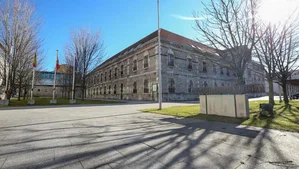Former Catalan Parliament President Laura Borràs Faces Imminent Prison Sentence

In a significant development in Spanish judiciary, Laura Borràs, the former President of the Catalan Parliament, is on the brink of serving a prison sentence following a recent ruling by the Spanish Supreme Court.
Confirmation of Sentence
On February 12, 2025, the Spanish Supreme Court confirmed a sentence of four and a half years in prison, 13 years of disqualification, and a fine of 36,000 euros imposed on Borràs. This decision was made after the court rejected her appeal against the conviction for crimes of prevarication and document falsification. The crimes were committed during her tenure as the director of the Institution of Catalan Letters (ILC) between 2013 and 2018, where she irregularly awarded contracts to a known associate, totaling 335,700 euros[2].
Execution of the Sentence
The Supreme Court's confirmation has made the sentence final, and it has been referred to the Superior Court of Justice of Catalonia (TSJC) for execution. However, Borràs's imprisonment is not immediate, as she still has several legal avenues to explore. She can appeal to the Constitutional Court or even the European Court of Human Rights, requesting a suspension of the sentence while her appeals are being considered[1].
Proposal for Pardon
An intriguing aspect of this case is the proposal for a partial pardon made by the TSJC itself. During the initial sentencing, the TSJC suggested that the Spanish government consider a partial pardon to reduce Borràs's prison term to two years. This proposal was based on the court's view that the four and a half years sentence was excessively severe for the irregular contracting of a collaborator. The TSJC's endorsement of this pardon could significantly influence the Spanish government's decision if the pardon is brought to the table[1].
Legal Recourse
Before pursuing the pardon, Borràs's defense team may attempt to avoid imprisonment by filing an appeal with the Constitutional Court, accompanied by a request for precautionary measures to suspend the execution of the sentence. This approach is grounded in the argument that the imprisonment constitutes a significant restriction of fundamental rights, and it would be reasonable to delay it until all appeals are resolved. Additionally, Borràs could argue before the Constitutional Court that the TSJC's proposal for a partial pardon supports her case for a suspension[1].
Rejection of Amnesty
Borràs had also argued that she should be granted amnesty under the premise that her actions were part of the broader Catalan independence movement. However, the Supreme Court rejected this argument, stating that her actions did not fall within the context of the Catalan independence process but rather constituted administrative corruption and violations of public procurement laws[2].
As the legal battle unfolds, Borràs's case continues to draw attention due to its implications on public administration and the judiciary's stance on corruption. The outcome will be closely watched, especially given the political and legal complexities involved.
Related Stories

Understanding the Complexities of Disinheriting Children in Spain: A Guide for Expats
Expats in Spain face complex inheritance laws, particularly around disinheriting children. Understanding regional variations and legal rights is crucial for compliance.

Pablo Hasel Released After Four Years of Incarceration: A Milestone in the Fight for Freedom of Expression
Rapper Pablo Hasel's release after four years marks a pivotal moment for freedom of expression in Spain, igniting debates on artistic freedom and legal reform.

Court Orders Retrial in Cantabria After Annuling Sentence for Insulting a Judge
Cantabria court annuls sentence and orders retrial in case of individual accused of insulting a judge, highlighting Spain's commitment to judicial fairness.

New Presidency at the Catalan High Court: Merce Caso Replaces Jesús María Barrientos
Merce Caso takes over as president of the Catalan High Court, stepping into a role pivotal for ongoing high-profile cases amidst Catalonia's legal and political tensions.

Manuel José Baeza Díaz-Portales Appointed President of the Valencia High Court of Justice
Manuel José Baeza Díaz-Portales appointed as President of Valencia's High Court of Justice, bringing experience and stability to the role.